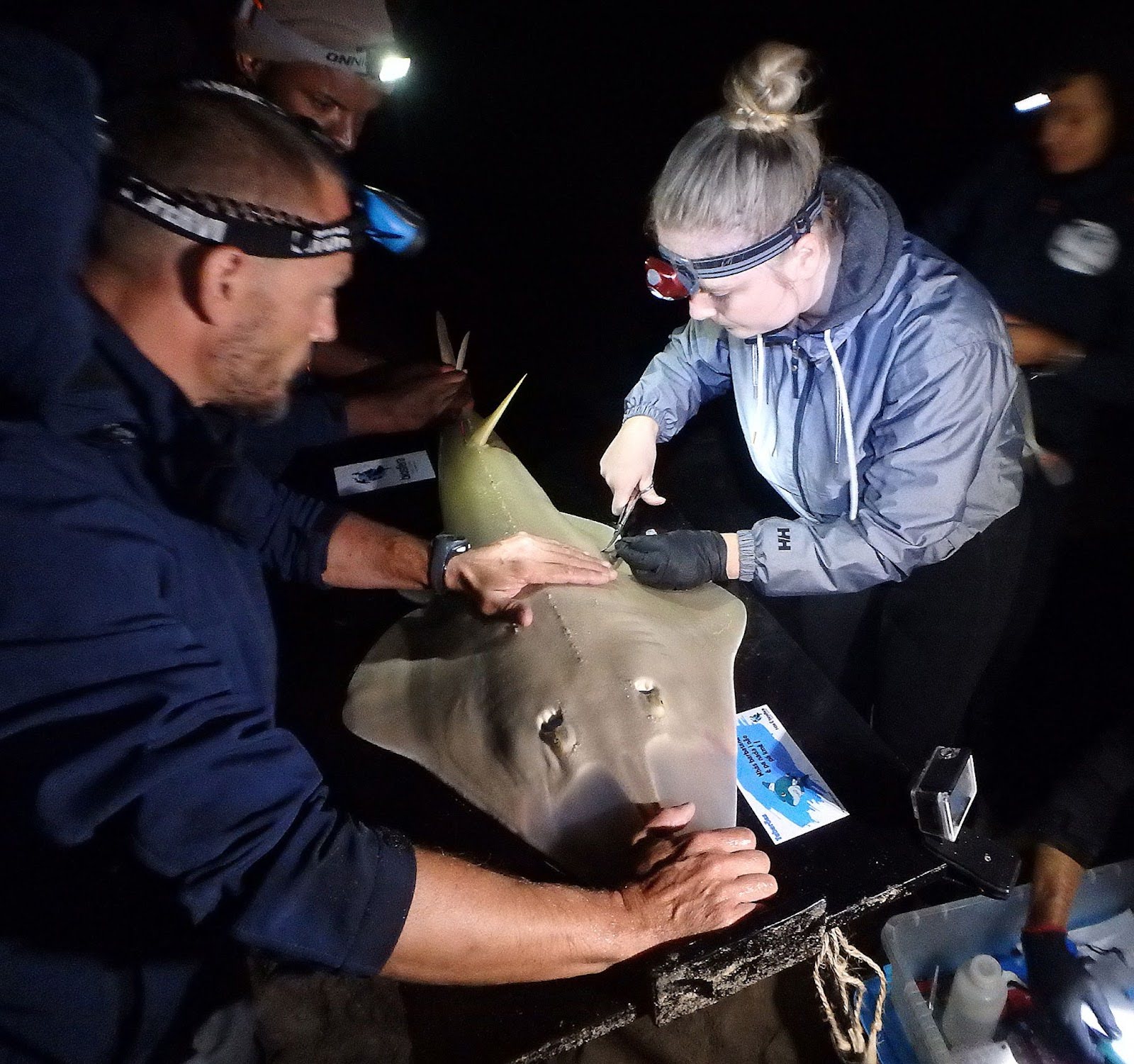.jpg)
I grew up on the Eastern Shore of Nova Scotia, where weekends often meant sandy feet, salt air, and endless hours by the sea. From as early as I can remember, the ocean was at the center of my world. My parents still have some of my first Crayola shark drawings tucked away, and I can vividly recall my Nanny reading me ocean science books at bedtime instead of fairy tales. Later, watching the documentary Sharkwater gave me the spark to focus my curiosity on sharks in particular. It showed me both their beauty and their vulnerability through powerful storytelling, and inspired me to be part of their future. These moments marked the beginning of my understanding of ocean impact and the way the ocean could shape not only ecosystems and species, but also the very person I was becoming.
The connection that I felt with the ocean eventually led me to Dalhousie University, where I studied Marine Biology and took part in their very first “Biology and Conservation of Sharks, Skates, and Rays” field course. It was a defining moment. I had found my passion, my purpose, and my first opportunity to see how research could make a tangible impact for the ocean. Years later, I’ve come full circle. Since 2017, I’ve been part of the very same teaching team for that course, first as a Teaching Assistant and now as a Co-Instructor. Each year, I get to mentor the next generation of shark researchers and conservationists, and show them that ocean impact isn’t just about collecting data, it’s about making choices that reduce harm, build knowledge, and shape a healthier future for our oceans.
Sharks and rays in particular stole my heart in the world of marine biology a long time ago. They are vital to ocean ecosystems, yet many species are understudied and misunderstood, despite the vital roles they often play in maintaining healthy ocean ecosystems. Since 2017, I’ve been part of the Cabo Verde Elasmobranch Research and Conservation Project, which has allowed me to contribute to ocean impact on an international scale for these incredible animals. Through this project, I am part of a team that trains local shark enthusiasts and researchers on the island nation of Cabo Verde, approximately 500 kilometres off the coast of West Africa, building capacity that lasts long after our team leaves. Together, we’ve established ongoing mark-recapture tagging studies for species such as the critically endangered blackchin guitarfish and the endemic Atlantic weasel shark.

The blackchin guitarfish has been at the heart of much of my research. For my Master’s thesis, I created the first-ever complete genetic map, or genome, for any of the giant guitarfish species. For me, this was more than just a scientific first; it was a way to give conservationists, managers, and policymakers a powerful new research tool. A genome is like a blueprint that can be used to show how healthy and diverse a species’ population is. In places like Cabo Verde, where we still know very little about the blackchin guitarfish, this information can be critical. It can help us understand whether populations are strong or at risk, and as such, could guide decisions about how to best protect them. For me, this work represents real ocean impact: turning science into something that can help safeguard one of the planet’s most endangered group of marine fishes, particularly in an island nation where their geographic isolation may make them especially vulnerable.
Each year, I also have the privilege of taking Dalhousie students out on the water to tag juvenile blue sharks. In recent years, our team has shifted away from traditional fishing methods and instead uses nets to gently scoop the sharks out of the water that swim close to the boat. This eliminates the long “fight time” that happens when a shark is hooked using a rod and reel and struggles against a fishing line, avoiding mouth injuries from hooks, and allowing us to release sharks back into the ocean within 10 minutes with one less stressor on the animal. For me, this evolution in methods embodies ocean impact, showing students that it is not only possible but also necessary to continually improve the way we conduct science to minimize harm while maximizing the knowledge gained.
.jpg)
Today, I bring this same ocean impact mindset to my work as an Ocean Consultant at Pisces. For me, ocean impact is about combining passion with practicality, bridging the gap between scientific research and real-world application. At Pisces, I get to support projects that strengthen ocean knowledge, improve conservation practices, and help researchers and organizations navigate the complex regulatory and management landscape.
What I love most about this role is that it allows me to contribute beyond my own field of research. I can amplify ocean impact by helping projects succeed—from the planning stage, through funding, permitting, and execution—all while keeping conservation and sustainability at the forefront. My background in shark research keeps me grounded in the “why,” while my role at Pisces gives me the tools to support the “how.”
For me, ocean impact is personal. It began on the beaches of Nova Scotia, grew through years of shark research, and now extends into my work helping others realize THEIR ocean projects. Whether I’m mentoring students, building capacity internationally, or supporting conservation initiatives at Pisces, my guiding principle remains the same: we all share a responsibility to leave the ocean healthier than we found it.